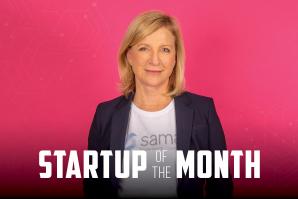In the wake of COVID-19, orders to stay at home took over the second quarter of 2020. Kwamane Liddell, an emergency nurse, wants to help seniors have the option to stay home while getting the support they need. Sacramento-based DispatchCare (formerly Mlezi Health), founded in 2019, is a home health app that offers 24/7 virtual care assistance.
For a subscription fee starting at $19.99 per month, users have access to various options, including food and medication delivery, rides for errands, and other services. Anyone can use the app, but DispatchCare focuses on patients who are at home following surgery.
“We make it easier for our most vulnerable community members to get the care they need to stay independent and stay home,” says Liddell, DispatchCare’s founder and CEO.
The aging population is on track to get much bigger in the upcoming years. By 2030, state projections estimate that 9 million Californians will be over 65 years old, which means that 21 percent of residents will be seniors (a higher proportion than in Florida, the so-called retirement state), according to CalMatters.
For that reason, launching the app in the Capital Region was practical. For Liddell, it was also personal. In 2018, his grandmother, at 75 years old, suffered from a degenerative nerve disease. She went from jumping rope and doing aerobics to using a wheelchair. The family came together to help, taking various shifts to support her 80-year-old husband, but it became clear that reinforcements were necessary. With his experience in health care, Liddell partnered with his friend, Byron Madison Jr., to create the app. The app, a finalist in the 2020 UC Davis BigBang Competition, aims to raise $95,000 for its first phase to partner with medical and geriatric groups in the Sacramento region and Bay Area.
“I always want to explore new ways to solve problems,” Liddell says. “One of the reasons that we created (DispatchCare) is because we want to solve a problem that 12,000,000 families struggle with every day.”
Developing the app took about three months. Madison, who is the chief operations officer, has four years of experience leading health care IT teams. They were able to create a beta version of the product from $5,000 they bootstrapped. There are five members on the team, all working virtually in different parts of the country.
Kim Brown Sims, one of the company’s advisers, had been working on an unrelated project to provide non-medical in-home care services. Liddell’s idea aligned perfectly with this project and she connected the two parties and joined the advisory board.
“My dad, when he was in his 80s and before his passing, received help from me and my brother,” says Sims, CEO of the Napa-based KBS Leadership Consulting. “We also had in-home care. Having DispatchCare available would have been very helpful and less expensive than full-time in-home care.”
DispatchCare offers different packages depending on need, with various discounts on delivery fees. The app is available in California, Texas and Illinois. Liddell, whose grandmother has since regained her independence with support from the app, expects to expand into Arizona and Florida by 2022.
“We are disrupting the $173 billion home health industry by providing services that are traditionally only available to wealthy families,” Liddell says of the projected industry revenue by 2026 (although the industry has been experiencing revenue loss as a result of the coronavirus pandemic). “We’re making those services available to all families.”
–
Get our Startup of the Month column and other web exclusives in your mailbox every week: Sign up for the Comstock’s newsletter today!
Recommended For You

Startup of the Month: Sama Learning
VR platform expands learning possibilities
This spring, COVID-19 forced schools to go online. But, for the most part, the teaching models remained the same. Sama Learning, a Nevada City-based startup, wants to transform those models.

Startup of the Month: RAIVES
Medical clip helps organize hospital room equipment
As a hospital assistant at UC Davis Medical Center, Tony Braham helps nurses lift and move patients. In other words, “We’re the muscle of the hospital,” Braham says, and his startup aims to help “the muscle” be more mobile.

Startup of the Month: OpenGrants
Platform simplifies search for public funding
Based in Sacramento, OpenGrants is a free platform that uses machine learning to sift through, list and match users with grant writers and opportunities. The platform reduces the opportunity cost inherent in the grant funding process by 30-40 percent.

Startup of the Month: Humaxa
A new model for employee-satisfaction surveys
Humaxa uses artificial intelligence and natural language processing to help employers boost productivity and satisfaction among their workforce.



